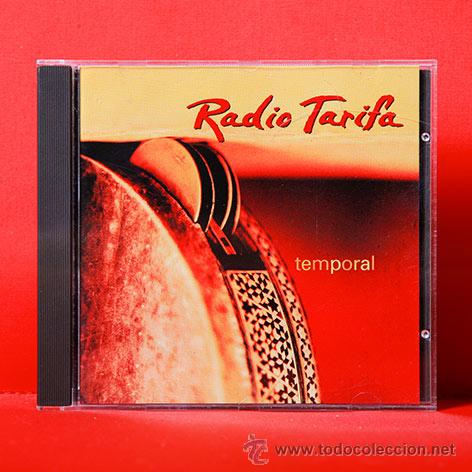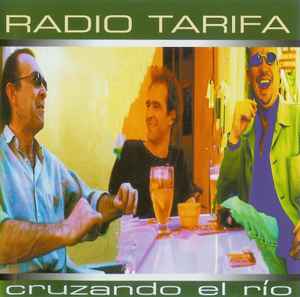No not a radio station, but a unique band that emerged in Andalucía in the 1990s. After nearly 20 years of touring throughout the world and the release of four albums, the group gave its farewell performance in Barcelona in November 2006.

A friend gifted me a copy of this band’s second album, TEMPORAL, shortly after its release in 1997. She hadn’t heard them play, but liked the cover!
Well, the cover was indeed good, but the music was sensational! A fascinating and unique fusion of several styles.
This multi-national music ensemble, combined Flamenco, Arab-Andalusian music, Arabic music, Moorish music and other musical influences of the Mediterranean, the Middle Ages and the Caribbean.
The name Radio Tarifa comes from an imaginary radio station in Tarifa, a small town in the Spanish province of Cádiz, Andalucia, the closest part of Spain to Morocco.
Radio Tarifa and me
Serendipity kicked in during a holiday in Extremadura in 2002 when we arrived in Plasencia and I discovered that Radio Tarifa was due to play in the square that night. What an amazing coincidence!
And what a great concert it was! In the interval I approached the bass player, who I knew to be English, and had a great chat. David Purdye, a Geordie, had joined the band as a temporary replacement. Despite having no Spanish, he was still with the band several years later … and loving it.
I was to see the group perform live twice more, later that year in the huge capacity Bridgewater Hall in Manchester and a year later in a sports hall in Warrington, with a capacity of about 50. Down on their luck, or what?
Radio Tarifa split up in 2006, their lead singer and driving force, Benjamin Escoriza, died in 2012 and that was effectively that for this unique band.
History of the band
Both Fain Dueñas (percussion, Spain) and Vincent Molino (flute, France) were students of Moroccan multi-instrumentalist and composer Tarik Banzi of the Al-Andalus Ensemble. Together they founded an early music group playing music from the late Middle Ages and Renaissance called Ars Antiqua Musicalis, although this group was unable to find commercial success.
When they met Benjamin Escoriza (Granada), a troubador flamenco singer raised by gypsies, in Madrid in the late 1980s, the last piece was in place.
Their first recording together, Rumba Argelina, was recorded in 1993 and became a sensation in Europe when it was released in 1996, and again when it was issued (through association with Nonesuch Records) in America in 1997.

The critical and financial success of that disc made it possible to put together a fully-fledged touring band which played throughout the world.
After nearly 20 years together, according to their website their farewell performance took place in November 2006, in Barcelona.
Discography
- Rumba Argelina (1993)
- Temporal (1996)
- Cruzando El Rio (2001)
- Fiebre (2003) (live at the 2002 Toronto Small World Music Festival)
RUMBA ARGELINA was presented as an eclectic work with Arab, Oriental, German Medieval, old Andalucian, Sefardic, Sanabrian music and some themes composed by Fain with lyrics written by Benjamin Escoriza.
The CD had fantastic reviews and received a great public reaction both in Spain and internationally. By this time the group had grown to eight people with a flamenco dancer included. They toured Spain and different European countries, with tremendous success.
On their second album, TEMPORAL (1996), they tried to go deeper into the traditional Spanish folklore that defines them, making a creative and wonderful sound with music from different Spanish regions. Two of the songs were sung by the gypsy singer Rafael Jimenez "Falo" who is one of the great singers of traditional flamenco. His interest for the traditional songs of the north of Spain and flamenco are what attracted him to RADIO TARIFA.
On CRUZANDO EL RÍO (2001), recorded in Faín's then recently completed studio, RADIO TARIFA proposed a new voyage in Iberian music with diversions to Renaissance ("Si j'ai perdu mon ami" de Josquin Desprez) and traditional japanese music ("Gujo Bushi") with the collaboration of flamenco dancer Joaquin Ruiz and the singer/piper Merche Trujillo.

This work received great international critical acclaim (one of the top ten best records of 2001 on the "World Music Charts Europe"). RADIO TARIFA was nominated for the "BBC Radio 3 Awards for World Music - 2001".
RADIO TARIFA celebrated the tenth anniversary of their first groundbreaking disc in 2003 with the release of FIEBRE (Fever), their first ever live album. With it they not only capture the exhilarating 'fevered' atmosphere of their live gigs, but also show just how far they had evolved during their first decade together.
FIEBRE proved to be another critical success for the band, with ROOTS calling it "exemplary" and MOJO stating that "they damn near ignite, pouring their souls into the set." The album received a nomination for the "BBC Radio 3 Awards for World Music - 2003" and has also been nominated in the Best Folk Album category at the 2004 Latin Grammy Awards.

Personnel
RADIO TARIFA was created at the end of the 80s by three musicians: Fain S. Dueñas, percussions, strings and arrangements, Benjamin Escoriza, singer and lyric writer, from Granada, and Vincent Molino, in the wind section.
- Benjamin Escoriza - vocals
- Fain Sanchez Dueñas - darbuka, plato, backing vocals
- Vincent Molino - ney, crumhorn, poitou oboe
Guests:
- Jaime Muela - flute, soprano saxophone
- Pedro Esparza - soprano saxophone
- Amir Haddad - oud, backing vocals
- Wafir Sh. Gibril - accordion
- Ramiro Amusategui - buzuki
- Jorge Gomez - flamenco guitar, electric guitar
- Sebastian Rubio - pandereta, bongos
- David Purdye - electric bass, backing vocals
- Peter Oteo - electric bass
The name RADIO TARIFA is an explicit reference to the type of musical wave that the group wanted its listeners to catch - Cape Tarifa is the point of Spain which is closest to Africa.
According to the group: "Tarifa is a frontier town, a no-man´s land and, above all, the Mediterranean´s balcony". RADIO TARIFA´s world was one of Iberian musical styles (flamenco, Arab-Andalucian, medieval and Castillian) where unfolding melodies and an enriched rhythmic base permitted continued dialogue between the percussive instruments, wood and string sections, and voice.
Distancing itself from all forms of musical purism in their choice of timbres and treatment of melodies, the group mixed arrangements of traditional compositions with their own original works. They used instruments which were played in Ancient Egypt (ney : a cane flute), and others from classical Greek and Roman times and Mediterranean instruments such as the wooden oboe or harmonium, combining them with modern instruments like the saxophone or electric bass guitar. The resultant music is both familiar and exotic.
Touring history
Since the release of Rumba Argelina, they have played in hundreds of concerts and each time RADIO TARIFA played, they left their audience hypnotized by their richness of rhythms and melodies.
Apart from performing regularly in Spain, RADIO TARIFA played abroad and audiences in the following countries had the chance to enjoy their music : Germany, Italy, France, United Kingdom, Ireland, Belgium, Switzerland, Holland, Portugal, Sweden, Finland, Norway, Denmark, Luxembourg, Hungary, Eslovenia, Austria, Greece, Turkey, Morocco, ,Egypt, Palestine, Australia, New Zealand, Brasil, Colombia, Mexico, Canada and United States.
RADIO TARIFA´s live performances consist of eight musicians.
The end
RADIO TARIFA broke up in 2006. On their website they announced:
“After 14 years of intense live shows, records, tiring trips, jokes, arguments and good feeling, we are taking a break for an indefinite period of time. Thanks to all of you who have given us all the love and support, following us during these fantastic years.“
Their lead singer and driving force, Benjamin Escoriza, died in 2012 and that was that for this unique band.
They left a great legacy though! I still listen to them often.